 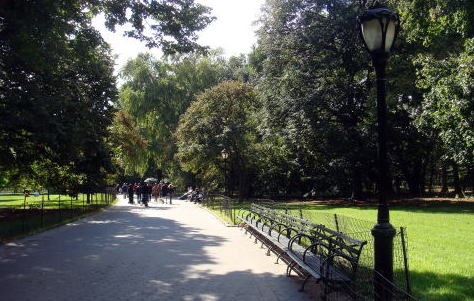
(L) Children are playing in the north shore beach of the Kauai Island,
Hawaii.
(R) The Central Park, Manhattan, New York serves as an oasis for visitors.
 Smoking in parks, on beaches and street should be banned. Smoking in parks, on beaches and street should be banned.
The ministers announced that displays of cigarettes and other tobacco products
will have to be removed at
the point of sale, which means they will have to be sold from 'under the
counter'. Further restrictions will
also be introduced to ensure children cannot buy cigarettes from vending machines, through the use of
tokens, electronic ID cards or remote control activation of the machines
by the shopkeeper or landlord.
The bans on smoking in enclosed public places came into effect in England
in July 2007 after similar moves
in the rest of the UK and certain outdoor spaces like railway platforms
and health service building grounds
also prohibit smoking outside. George Tomson and colleagues at the University of Otago, in Wellington,
New Zealand said: "The central argument is that outdoor bans will
reduce smoking being modeled to
children as normal behavior and thus cut the uptake of smoking. The outdoor
smoke-free policies may,
in some circumstances, such as crowded locations like sports stadiums,
reduce the health effects of secondー
hand smoke. It will reduce fires and litter; and are likely to helpsmokers'
attempts at quitting.
Mr. Thomson and his colleagues said research has shown the British public
favor greater restrictions on
outdoor smoking where there are children. Simon Chapman, professor of public health at the University
of Sydney, Australia argued against the idea. He said: "The ethics
here are about respect for the autonomy
of individuals to act freely, providing their actions do not harm others.
Source: Rebecca Smith, Telegraph.co.uk, December 11, 2008.
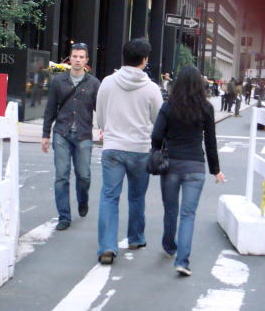 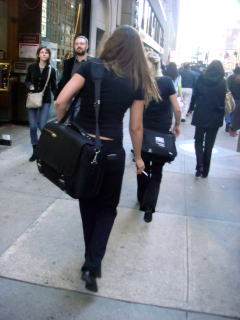 
Pedestrians are smoking while walking in Manhattan, New York, and in Kona,
Big Island, Hawaii.
 New York smoking ban may be taken outside. New York smoking ban may be taken outside.
Smokers in the land of the free are finding themselves increasingly less
free to pursue their habit. New York
City officials are the latest to consider banning smoking in their parks and outside space. Cigarette makers
Phillip Morris USA did not like the idea at all. "We believe that
smoking should be permitted outdoors except
in very particular circumstances, such as outdoor areas primarily designated
for children," a company
spokesman said. Such bans to remain rare but are increasing, with California
in the vanguard. State legisla-
tors there have prohibited smoking in all state parks and on parts of beaches,
two years after Los Angeles
extended its existing ban on playgrounds and beaches to parks.
Chicago still allows smoking in many of its parks, but bans it at beaches
and playgrounds. New York banned
smoking in most restaurants in 1995, followed by prohibition in workplaces and indoor public places in 2003,
three years before bans came into force in Scotland and four years before
they were introduced in England
and Wales. The Department of Health in England said today it had no plans
to extend smokefree areas,
saying such moves were up to local authorities.
Source: Guardian.co.uk. September 15, 2009.
New York City outdoor smoking ban begins.
Smokers in New York City will not be able to put the light on without paying a price in most public places
after an outdoor citywide smoking ban took effect in May 2011. The law,
which Mayor Michael Bloomberg
signed in February after it was passed by the New York City Council, will
make smoking illegal in New York
City's 1,700 parks and on the city's 14 miles of public beaches. Smoking
will also be prohibited in pedestrian
plazas like Times Square.
New York passed its first 'Smoke Free Air Act' in 1988, when smoking was
banned in public restrooms and
taxicabs. Since then, the law has been amended three times, most notably
in 2002, when smoking in some
indoor areas, including restaurants and bars, was banned.Reference :CNN News, May 23, 2011
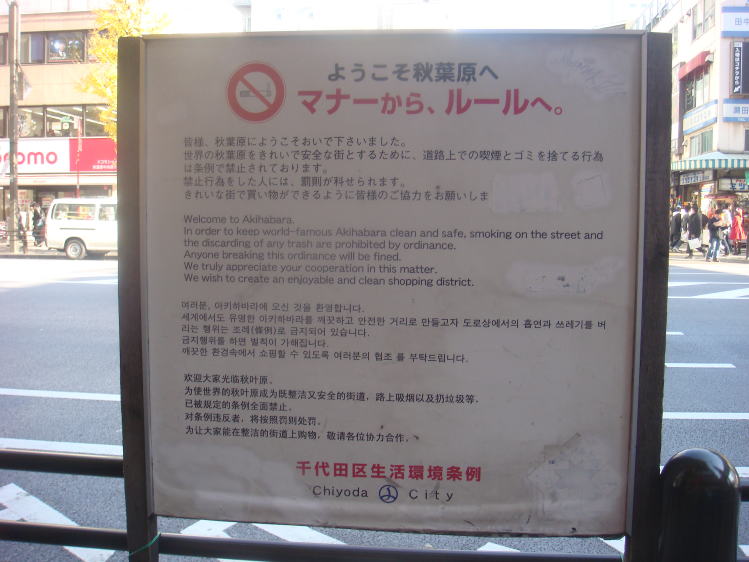
Information board notifying the smoking restriction on the street in the
Chiyoda Ward,
which calls itself Chiyoda City, and its name came from Chiyoda castle
of the Imperial Palace.
 Smoking on roads enhances the risk to a pedestrian. Smoking on roads enhances the risk to a pedestrian.
Smoking has been banned on the streets of Tokyo's Chiyoda Ward since October 2002. The streets in the
Chiyoda ward are patrolled by Inspectors in a yellow jacket, and when they
find a smoker, fine \2000 for
violations. The total amount of fine collected by the ward in the past
6 years reached to the amount of 94
million yen. Sixty municipalities, whose residents comprise 10% of Japan's population, have regulations
to ban or discourage smoking on the street. However, only three municipalities
assess fines for violations.
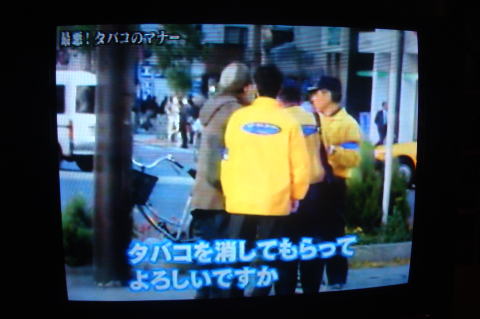 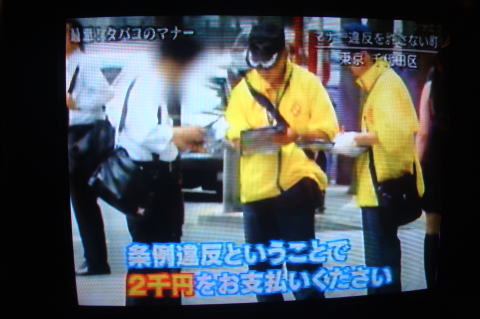
Inspectors handed out $20 tickets to smokers on downtown sidewalks of Chiyoda
Ward, Tokyo.
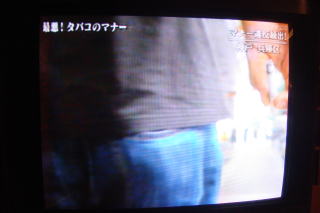  
Smoking in the street is very dangerous because the burning end of tobacco
is often at the children's eye level.
Source: NHK broadcast.
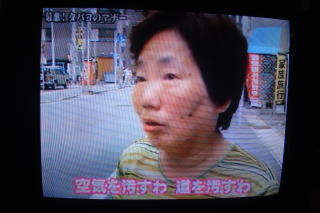 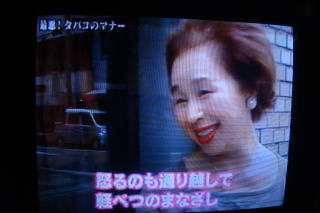
Women in Tokyo residential area complaint about smokers that they make
air dirty and throw away
cigarette end everywhere. Anger is not the word. We see smokers with utmost
contempt.
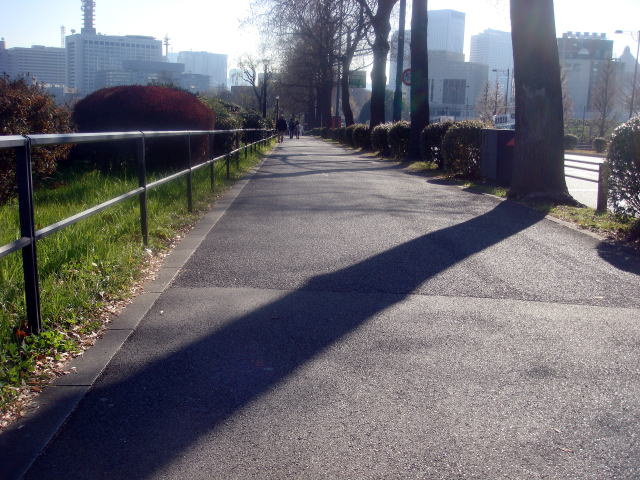
No cigarette butts, no trashes on the sidewalk of Chiyoda City, by beside
of Emperial Palace.
Photographed in December 2009.
 Smoking Regulations in Japan is reverse to the world. Smoking Regulations in Japan is reverse to the world.
Tobacco Industry is using Aggressive Street and Sidewalk-Smoking Bans
to Prevent Indoor Smoking Bans, including those in Bars and Restaurants.
An enlightening article by Dr. Simon Chapman in the current issue of
Tobacco Control presents the surprising news that Japan Tobacco Inc. is
supporting strict and aggressive street smoking bans in Japan,
in order to foil to prevent clean indoor air policy?
|
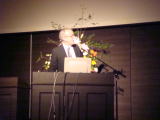
At the first blush, it might seem to shock that a tobacco company would
support such draconian smoking
bans. However, on closer examination, it turns out that the tobacco industry's
support for these measures
in Japan is actually a foil as Chapman calls it - an attempt to re-frame the issue so that attention is diverted
from efforts to ban smoking indoors: in workplaces, includingbars and restaurants.
As the article explains: "Senior Japan Tobacco representatives have
been enthusiastic supporters of the
street smoking bans, while maintaining staunch opposition to indoor smoking
bans. Dr Yumiko Mochizuki
of National Cancer Center Reseach Institute of Japan suggests that the intense support of the policy by
the company may suggest it sees the street ban as an important foil to
hold off indoor bans. Because of
the smaller number of cumulative "smoking hours" available, the
numberof cigarettes forgone, because
of that street smoking bans, would be incomparably smaller than would be caused by indoor workplace
bans, including those in bars and restaurants.
By supporting street bans, Japan Tobacco would calculate that it could
ride the popular wave of Japanese
anti-litter sentiment, basking in civic-minded corporate social responsibility.
In doing so, it helps contribute
to the continuing framing of public smoking as an issue of manners and consideration, cleanliness and safety,
while its role in chronic disease is sidelined. Mochizuki argues that Japanese
model may well be being
promoted as the way to go elsewhere in the often crowded cities of Asia."
This story should give anti-tobacco advocates in the U.S. some pause. I
have argued that the ever-
increasingly aggressive attempts to ban smoking almost everywhere - including the wide-open outdoors -
is going to harm our efforts to ban smoking in workplaces where people
actually need the protection.
For one thing, it diverts attention from chronic exposure to secondhand
smoke and puts the sole focus
on acute, even fleeting exposures. Second, it casts us as anti-smoking zealots who are trying to eliminate
all public smoking. Third, it takes us away from a strong scientific base.
Fourth, it risks losing our credibility
by asking the public to accept increasingly hysterical claims.
When you see tobacco companies starting to support a policy, you better seriously reexamine your support
for those policies. If the tobacco industry truly felt that street smoking
bans would enhance the overall goal
of protecting people from secondhand smoke, it would certainly not support
these measures. Perhaps the
industry is banking on a backlash and/or on a diversion of attention.
My own prediction is that the movement's new obsession with trying to extend smoking bans to the outdoors,
including parks, streets, and sidewalks is going to backfire by diverting
attention away from the need for
bans on smoking in the workplace and from the effort to extend protection
to all workers in bars, restaurants,
and casinos. That's where our attention should be not on trying to protect fleeting exposure from any whiff
of smoke in a public park, street, or sidewalk.
Dr. Chapman* is the Professor of University of Sydney, School of Public
Health. His commentary helps to
elucidate why my opinion-editorial in the New York Daily News was so important.
Exaggerated health claims
and the support of draconian policies that are not based on scientific evidence are hurting, not helping the
smoke-free cause.
 Dr. Chapman gave us a special guest speech at the Annual Meeting of Japan
Society for tobacco Control Dr. Chapman gave us a special guest speech at the Annual Meeting of Japan
Society for tobacco Control
held in Sapporo, Hokkaido, Japan, in September 2009.
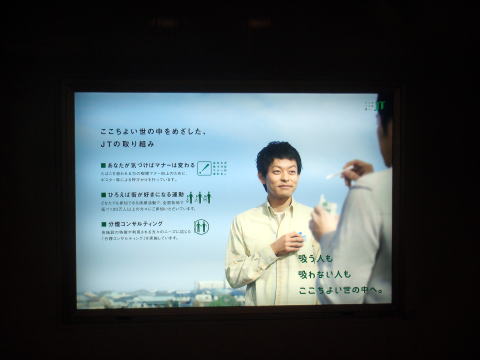
This shows an advertisement displayed attached to the wall of the platform
st Tameike-Sanno subway station,
very closed to the prime minister's official residence.
It says Japan Tobacco Inc. will make an effort to create a comfortable
society for smokers and non-smokers.
Three important items: keep smoking manner, do social activity to clean
a street and supporting creating of
a separate indoor smoking room.
 Tobacco industry promotes to establish a separate smoking room in a restaurant
and pub for smokers, Tobacco industry promotes to establish a separate smoking room in a restaurant
and pub for smokers,
trying to control the mind of all Japanese people by a repeated TV commercial.
「屋外で吸えないので喫茶店に入って吸う」
要約 タバコ会社が屋外の禁煙活動を支援していると聞いたらショックを受けるだろう。しかし、よく観察吟味してみると、
日本のタバコ会社は国内での屋内レストランやバーに於ける全面禁煙を実行し、労働者の健康を守ろうという国民の関心を
そぐために、そのエネルギーを屋外に向けさせている。タバコ会社の上級役員は屋内での全面禁煙には強い反対を維持し
ながら屋外喫煙防止には力を入れている。国立がんセンター研究所の望月久美子博士は、タバコ会社のこうした動向は屋内
全面禁煙への尽力を幻惑するための重要なステップだと語る。屋外喫煙を防止した方がレストランやバーなどの屋内喫煙を
禁止するよりもタバコ消費量の落ち込みは少なくて済む。タバコ会社は街頭での喫煙行為禁止を支持することにより街の
清掃活動に便乗し、禁煙支持の活動家と共に社会の一員としての責務を担っていると広報している。タバコはマナー、街の
美観の問題として、この日本モデルをアジアの他の地域で広めようとさえしている。
広々とした屋外での熱狂的な喫煙禁止運動は、屋内職場で本当に必要としている人々をタバコ有害煙 の脅威から救おうと
しているわれわれの運動を阻害するのではないかとの疑問がある。屋外での喫煙禁止は*(建物近辺や人通りの多い歩道、
子供たちの遊ぶ公園などに於ける喫煙行為を除いて考察すれば)、強い医学的根拠に基づいていない活動であり、
ヒステリックな要求を呑むことは、かえって正しい活動をしているものへの信頼性を喪失させることになる。
*( )内の注釈は禁煙席ネット宮本の意見を挿入。
もし、タバコ会社が禁煙の政策に同調するようなら、あなたがその政策を支持することが本当に正しいのが再度吟味して
みる必要がある。もしタバコ会社が本当に屋外での規制処置で副流煙被害を救えると感じるならタバコ会社はそのよう
な禁止措置を支持しないだろう。多分、それを非難するか、それから注意をそらすであろう。レストラン、バー、カジノ
など屋内職場での喫煙全面禁止こそより重要であり、瞬間的に消え去る公園、街路での喫煙に対して力を注いで行くべき
ではない。( シモン・チャプマン、シドニー大学公衆衛生校教授 )
要約 タバコは消費者の視線から避けた形で保管し、目立たないように販売すべきだ。子供たちが自動販売機でタバコを
買えないようにIDカードなどを使用すべきである。英国でも鉄道ホーム、保健施設などの屋外での喫煙禁止が実行されて
いるが、屋外喫煙の禁止は子供たちを悪い習慣から遠ざけ、喫煙し始めることを防止出来る。混雑した屋外での喫煙禁止は
タバコ有害煙を防止し、火災や吸い殻が街を汚す弊害を排除でき、喫煙者に禁煙を促す機会を与える。英国国民は子供の
いる屋外での喫煙禁止に賛成している。しかし、シドニー大学のチャップマン教授は喫煙行為が他人の健康を害する場面を
除いて、屋外では喫煙者の自由なモラルに委ねるべきと話している。
路上喫煙禁止条例
2002年に全国で初めて路上喫煙を禁じる条例を施行した東京都千代田区で千代田区が始めた歩行者用道路での喫煙規制
(禁止)条例は、今日本全国に広がっている。千代田区が施行後6年間の過料徴収総額は9,400万円と、一億円近くに
達している。規制範囲も皇居を除く、ほぼ全域の範囲に広げた。世界の頂点を行く優れた屋外喫煙規制である。しかし、
「道路で吸えないので喫茶店に入って吸う」という、非常な奇妙な現象が起こっており、こうした規制の逆転化に対し
一般の人々は疑問を抱いていない。
タバコ副流煙の有害性を危惧するよりは、手に持ったタバコの火の危険性や、タバコの煙が流れてきた時に感じる不快感が
前面に出て来ているためと思われる。あたりかまわずタバコをポイ捨てする喫煙者に対する反感は非常に強い。タバコの
煙は屋外で、少なくとも6メートル以上流れて行くので、米国ハワイ州、イリノイ州などで出入口周辺での喫煙を禁止して
いる。しかし、外国では路上での歩行喫煙を禁止しているところはほとんどない。
屋内の方がタバコ副流煙に含まれる発癌物質などの濃度は高いので屋内での喫煙禁止を先ず先行するのが道筋と考えられる。
だが、路上禁煙条例を普及させた一方で,屋内の全面禁煙規制は非常に遅れている。世界では閉鎖空間内での全面禁煙が
進む中、日本では全面禁煙でなく喫煙と禁煙スペースをを分離する対策で満足していることが多い。この点、日本は喫煙
規制の点では世界でも極めて特異な存在になっている。
● 2022年現在、状況は大きく変化している。東京では従業員のいる飲食店では、原則、店舗内を全面禁煙とせねば
ならないが、食事の出来ない喫煙専用室を設置することが出来る。
As of 2022, the situation has changed significantly. In Tokyo, in principle, restaurants with employees
should be smoke-free inside the store. However, it is possible to set up
a designated smoking room
where eating is not allowed.
 屋外の喫煙規制は厳しく、屋内の喫煙規制はゆるやか 屋外の喫煙規制は厳しく、屋内の喫煙規制はゆるやか
 執筆 医学博士 宮本順伯 執筆 医学博士 宮本順伯
★This Web site is link-free.
The article was written in November 2008, and revised in December 2009
and January 2022,
by Junhaku Miyamoto, M.D., PhD.
Information was added in January 2022.
Copyright(C) 2008 Junhaku Miyamoto, All rights reserved.
|

